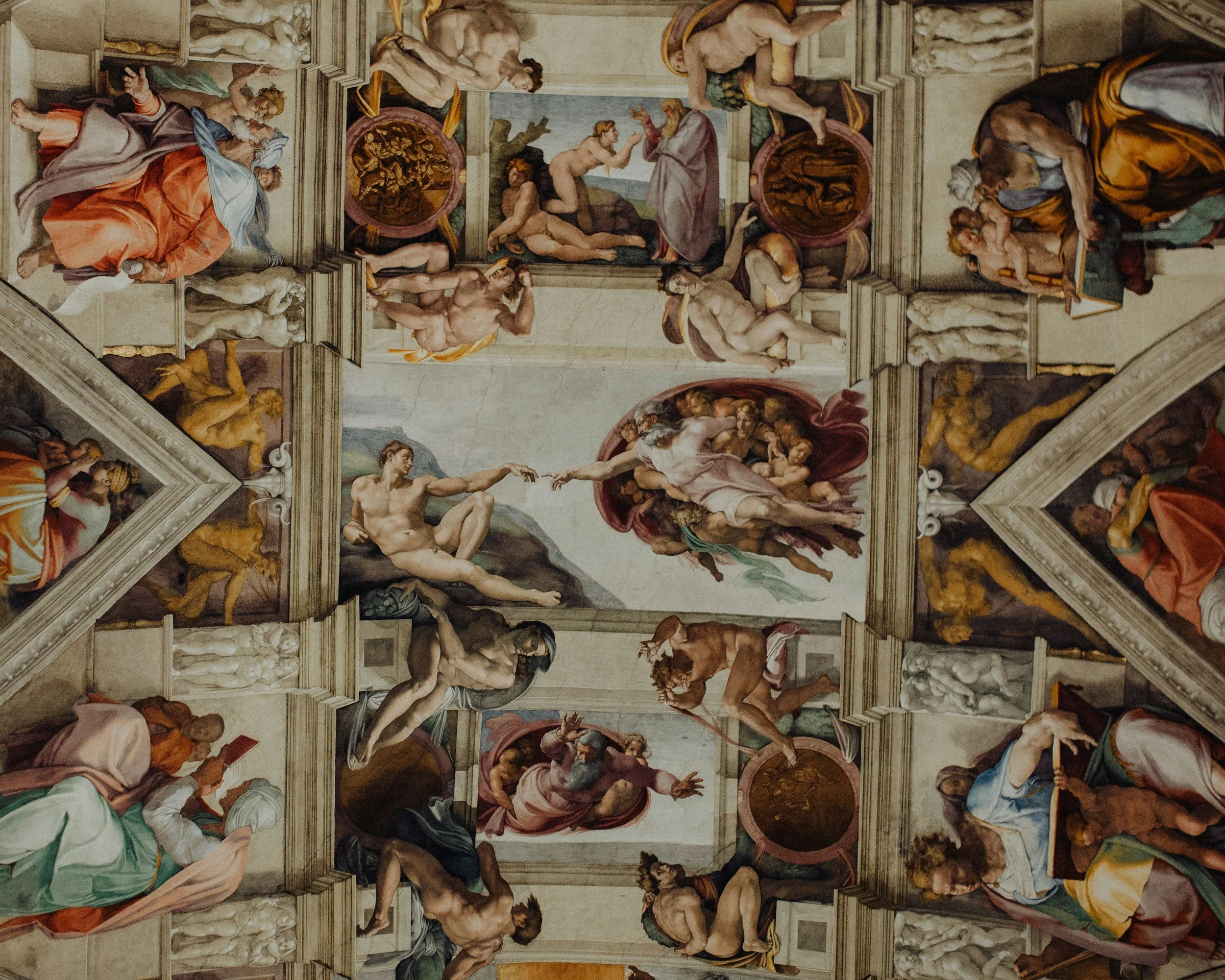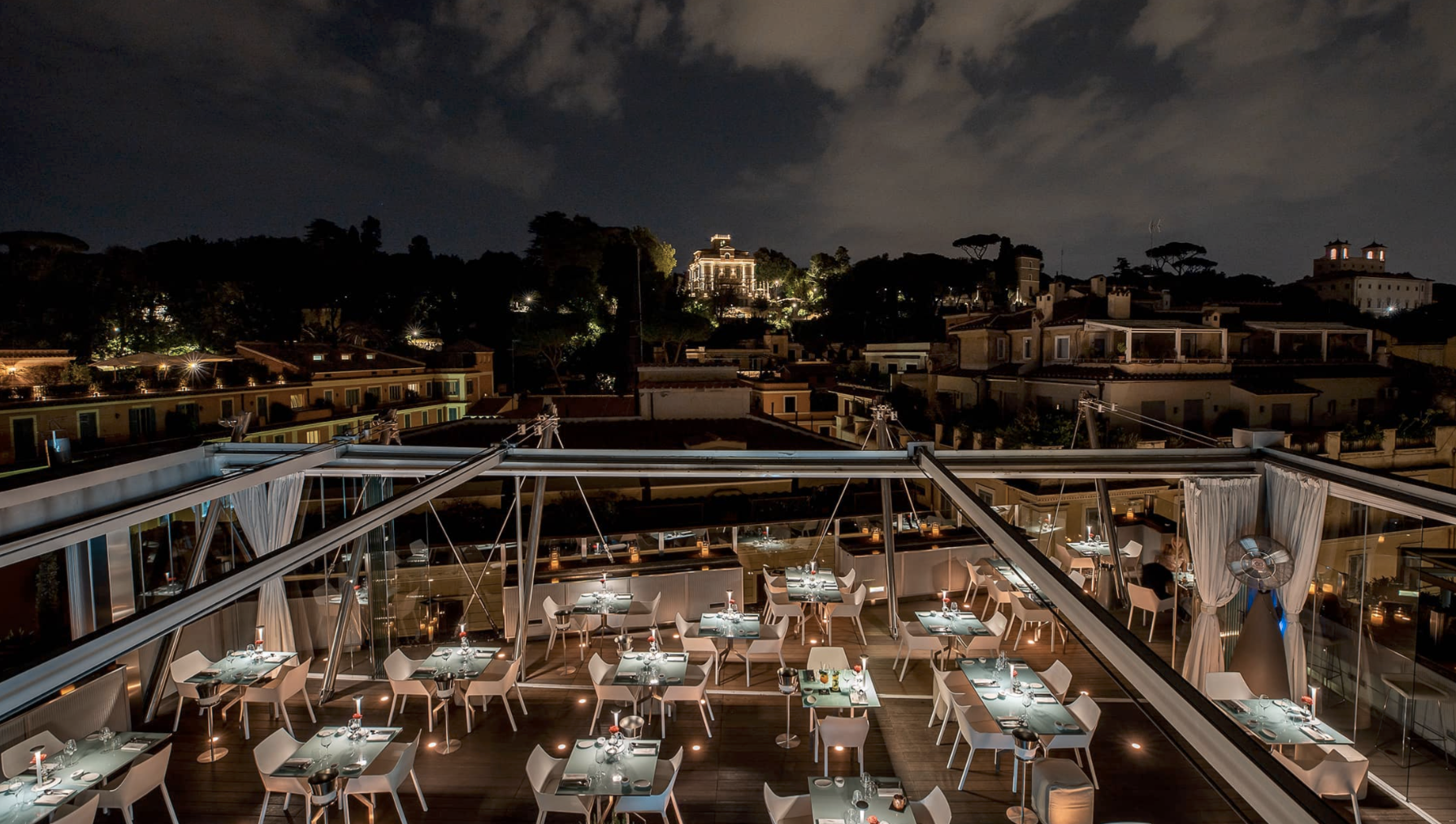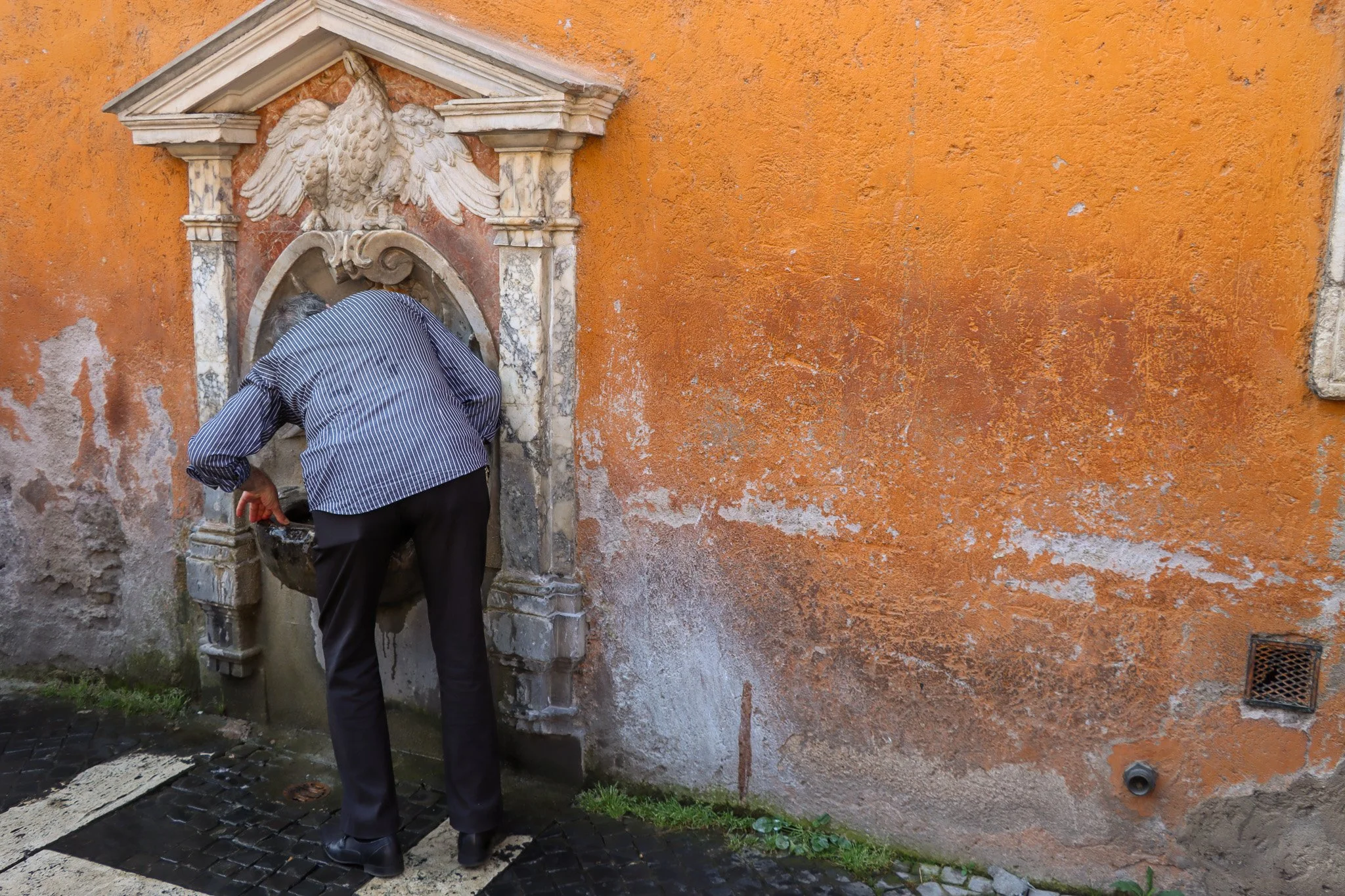
ROME
A city of layers—ancient, opulent, lived-in. Rome isn’t about checking off landmarks; it’s about pace, presence, and knowing where to look. This guide focuses on what matters: thoughtful meals, elegant stays, and meaningful ways to engage with the city—beyond the obvious.
Where We Eat
Roman food is bold, simple, and deeply place-specific. We skip the tourist traps and go straight to the trattorias, wine bars, and kitchens that move to the city’s rhythm.
Our Dinner Go-Tos
-
A local favorite in Monteverde, just far enough from the center to feel like a discovery. The fried gnocchi cacio e pepe is iconic, but the whole menu leans toward elevated comfort. Wine list is natural-leaning, crowd is relaxed but smart. Take the tram if you can—part of the charm. Click here.
-
In San Giovanni, this is Roman food with a bit of edge. The interiors are unfussy, the clientele mixed, and the kitchen is run by one of Rome’s most interesting chefs, Sarah Cicolini. Expect offal on the menu, and perfectly made amatriciana. Loud, energetic, and best with a bottle of house red. Click here.
-
Tucked between Testaccio and Ostiense, this spot bridges classic and contemporary. Think: sweetbreads with carrot cream alongside rigatoni alla gricia. Warm lighting, polished but unfussy service, and a seasonal menu that stays grounded in Roman tradition. Click here.
-
In Testaccio, built into the side of Monte dei Cocci. It’s well known, yes, but for good reason. Pasta is reliably excellent—especially the tonnarelli cacio e pepe—and the setting (arched brick walls, cool in summer) makes it feel removed from the noise. Click here.
-
Also in Testaccio, but leaning more modern. Sleek interiors, beautifully plated food, but not precious. The tasting menu is there if you want it, but à la carte makes it a smart choice for a nicer weeknight dinner. Wine list is deep and well-curated. Click here.
-
Minimalist interiors, focused service, and elevated Roman dishes without any show. The pasta is handmade, the plating elegant, and the mood is quiet but warm. Trastevere without the noise. Click here.
-
Bright, stylish, and health-forward without being boring. Known for its fresh salads, crudo, smoothies, and thin, crisp pinsa—but there's pasta and wine too. The vibe is clean and international, perfect for a lighter dinner after a long travel day or before a late night out. Both locations are central and easy to walk to, with the Via Veneto one feeling a bit more polished. Click here.
Street Food
-
A temple to the suppli, run by a former fine dining chef. Crispy rice balls stuffed with ragu, carbonara, or amatriciana—each one better than the last. Interiors are cozy but dark, so take it to-go and eat it on a sunny step. Click here.
-
Triangular pockets of pizza bianca stuffed with Roman classics like chicken cacciatore or eggplant parm. It’s handheld, it’s hot, and somehow always hits. Order at the counter, stand outside, repeat. Click here.
-
The pizza bianca is legendary—flaky, salty, olive-oil soaked perfection. They also do fresh focaccia and simple sandwiches, but the plain stuff is what locals queue for. Fold and eat while walking. Click here.
-
A family-run bakery since the 70s, still flying under the radar. Pizza rossa, pizzette, and sweet buns in a retro space that feels untouched. Pure neighborhood energy.
-
Fried baccalà wrapped in paper and handed to you with lemon. That’s it. The crispiness is next level, and it’s weirdly refreshing—even on a hot day. Open only in the evening.
-
The name says it all. This is your go-to for a quick suppli fix before dinner or after drinks. Classic, molten, and always under €2. Don’t overthink it. Click here.
-
Another contender for best pizza bianca in the city. Lighter than Roscioli’s, slightly crispier, and just as addictive. Also serves square slices with toppings if you want something more filling. Click here.
Go All Out
-
Rome’s only three-Michelin-star restaurant, perched above the city with panoramic views. Heinz Beck’s tasting menu is exacting and elegant—think foie gras with almond foam, or lobster with chamomile. Service is formal but never cold. Jackets recommended, expectations met. Click here.
-
Two Michelin stars, but with an intimate, almost moody feel. Chef Anthony Genovese draws on Italian and Asian influences—tamarind, sake, caviar, bottarga—all composed beautifully. A special experience that doesn’t scream for attention. Click here.
-
A modern fine-dining room with a classic Roman heart. The carbonara is legendary, but so is everything else. Understated interiors, polished service, and a wine list built for those who care. Feels special without being stiff. Click here.
-
The view of the Colosseum alone is enough to justify a booking—but the menu holds its own. Sophisticated Mediterranean dishes served on a candlelit terrace, with sharp service and elegant pacing. Great for visitors, still loved by locals. Click here.
-
Set inside an Art Nouveau villa near the Tiber, this is old-world luxury at its best. Formal garden views, silver service, and a menu that walks the line between haute and heartful. A Roman answer to Parisian grand dining. Click here.
-
A more modern, creative approach. Open kitchen, high stools, seasonal tasting menus with a focus on technique and surprise. Less about occasion, more about experience. Feels cool, not corporate. Click here.
-
Michelin-starred, yes—but also deeply Roman. Sweeping city views, mirrored interiors, and a menu that blends old and new: think saffron risotto with oysters or veal cheek with smoked potato. Glamorous without trying too hard. Click here.
Best Desserts
-
Gelato spelled backwards—and intentionally a bit offbeat. Flavors are intense and often unexpected (gorgonzola-honey, ricotta-strega), but the classics are just as good. Creamy texture, seasonal focus, and a loyal local following. Click here.
-
Known for creative, often botanical flavor combinations: rose and black rice, basil and walnut, pear and gorgonzola. Organic ingredients, no weird additives, and plenty of vegan options. A must for the flavor curious. Click here.
-
Savory by day, sweet by night. Their namesake maritozzo—Rome’s iconic cream-filled brioche—is executed with serious care. Try the classic with whipped cream, or the seasonal versions (hazelnut, citrus, pistachio). It's decadent but balanced. Click here.
-
A rare combo: fully gluten-free and legitimately delicious. Grom’s gelato is made without artificial anything, and the cones, cookies, and toppings are all celiac-friendly. The pistachio is excellent, but the dark chocolate sorbet might be better. Great for when you want something sweet but clean. Click here.
-
A more polished, design-forward gelateria that still keeps quality high. Great for traditional Italian flavors—crema, fior di latte, stracciatella—with silky texture and generous portions. Bonus: warm melted chocolate drizzled inside the cone on request. Click here.
-
Focused entirely on tiramisu—classic, pistachio, strawberry, even vegan. Served in individual glass jars, which makes them feel just a bit more refined. A smart stop after dinner nearby. Click here.
-
Mentioned before, but worth repeating: the maritozzo here is the gold standard. Go in the morning for fresh cream or in the evening for a sweet bite on the walk home. Click here.
Where We Wake Up
-
A local institution with a cult following—for good reason. Stand at the bar for espresso and a pastry (the maritozzo is famous), or grab a table and linger. Excellent cornetti, best in the morning before the crowds hit. Click here.
-
A neighborhood bakery doing perfect Roman pizza bianca and rustic pastries. It’s not fancy, but it’s real. Grab something warm and head to the nearby market or sit on a bench like everyone else.
-
An old-school café with frothy cappuccinos and buttery cornetti. Small, classic, and full of locals. Don’t expect almond milk—just expect it to be good.
-
Gabriele Bonci’s bakery near the Vatican is known for pizza by the slice, but the morning pastries and breads are just as impressive. Try a maritozzo or one of the savory bakes if you’re not in the mood for sweet.
-
A Danish-Italian micro-bakery that could be in Copenhagen—but is better for being in Rome. Seasonal plates, house-made sourdough, soft eggs, perfect coffee. Minimal interiors, maximum flavor. Worth the short detour.
-
Tucked away on a quiet side street, Coromandel does a refined, sit-down breakfast that actually feels indulgent. Think ricotta pancakes, shakshuka, or eggs Florentine—plus beautiful ceramics and considered interiors. Click here.
-
A historic pastry shop that’s been doing things the same way for over a century. The cream-filled maritozzo is nonnegotiable. Grab a box to go, or eat it immediately on the sidewalk.
-
A Roman take on the New York brunch spot. Pancakes, bagels, French toast—but done with just enough Italian restraint. Go on a weekday for a more relaxed vibe.
The Night Starts Here
-
Steps from the Pantheon, with a mood that feels more Milan than Rome. Dimly lit, fashion-adjacent, and full of people who know how to order a drink. Cocktails are sharp, the crowd is considered, and the energy builds slowly. Click here.
-
A Roman classic that hits its stride around sunset. Outside tables fill up with locals playing chess, smoking, drinking wine. Inside, the bar scene ramps up as the night goes on. Relaxed, messy in the right way. Click here.
-
Futuristic, neon-lit, and cocktail obsessive. Think Tokyo-meets-Blade Runner, but the drinks are serious—refined takes on classics with house infusions and surprising pairings. Late-night energy, but works for a first drink too. Click here.
-
Hidden and reservation-only. Enter with a password, stay for high-concept cocktails made by bartenders who care. It’s a little performative, but in the best way. Feels secretive and indulgent. Click here.
-
Aperitivo in its purest form—free snacks, crowded steps, plastic cups filled with bitter drinks and locals in great sunglasses. Less curated, more atmospheric. Go for the energy, not the quiet. Click here.
-
A mezcal bar in Rome that somehow makes perfect sense. Loud, tropical, and very fun. Great for a post-dinner reset or spontaneous second wind. Click here.
-
Elevated—literally and otherwise. A sleek rooftop with Japanese cocktails, glossy interiors, and views over Rome’s rooftops. More international than local, but in a way that feels cosmopolitan, not generic. Click here.
-
A tiny natural wine bar with a devoted local following. Bottles line the walls, and the wine is poured by people who know exactly what to recommend. No frills, no pretense—just good wine and good lighting. Click here.
Where We Sleep
Hotel Valadier
Central location with surprising personality.
Intensely Italian. It’s central, affordable, and has just enough eccentricity to feel like a find. The rooms aren’t huge, but for an affordable, central, yet still luxurious stay, we love this charming option.
Image courtesy of Hotel Valadier
From ~€180/night
Located in the Tridente district
Rooftop restaurant with sunset views
Rooms range from classic to slightly kitsch
Easy walk to Via del Babuino and Spanish Steps
Rooms are small, but rooftop views and location make up for it
Espresso machine and fresh cookies always available in lobby
Ask for a corner suite with terrace access—worth the small upcharge.
Details To Know
Why We Like It
The Hoxton
Laid-back, affordable, and full of design moments.
Why We Like It
North of the Villa Borghese in Parioli, this outpost of the design-forward Hoxton brand brings Brooklyn energy to Rome. Think terrazzo floors, mid-century curves, and a lively lobby scene with DJs and coffee meetings. Located in a less tourist-heavy neighborhood. Great if you’re mixing work with travel.
Image courtesy of Tablet
From ~€210/night
Located in residential Parioli
Two restaurants on site
Rooms are compact but smartly laid out
Lobby bar often busy with locals
Easy access to MAXXI and Borghese gardens
No dramatic views, but beautiful interiors
Vibe leans young and international
Perfect for longer stays when you want space to hang between outings.
Details To Know
Why We Like It
Details To Know
G-Rough
Editorial, textured, and unforgettable
Why We Like It
A design-lover’s dream across from Piazza Navona. The building is 17th century, the interiors are raw, layered, and full of character—vintage Italian pieces, exposed frescoes, curated imperfection. Every corner feels styled — but lived in. For travelers who care more about mood than amenities.
Image courtesy of G-Rough
Details To Know
From ~€500/night
Located across from Piazza Navona on a quiet cobblestone street
Ten individually styled suites with vintage Italian furnishings
No on-site restaurant, but curated minibar + in-room breakfast
No spa or gym—this is about aesthetics, not services
Elevator is small and slow (but it’s there)
Staff is minimal but warm
Located steps from Piazza Navona
Great wine bar
For design obsessives and aesthetes. It photographs beautifully.
Rhinoceros
Part gallery, part residence, part architectural experiment—with views over the Forum.
Why We Like It
It’s bold, intelligent, and built for travelers who don’t want to feel like tourists. The experience feels curated but not curated for you—you're meant to explore it on your own terms. There's a sense of privacy and depth here that's hard to find in central Rome.
Image courtesy of Rooms of Rome
Details To Know
From ~€530/night
Located between the Roman Forum and the Aventine Hill
Created by Alda Fendi; includes on-site exhibition space
Large, apartment-style suites with kitchens and custom furniture
Some rooms have Forum-facing terraces
No full-service restaurant, but food service is available
Very quiet—ideal for longer stays or low-key travelers
Feels more like an art residency than a hotel
Book well in advance—availability is limited and discreet.
Hotel Vilòn
Elegant, intimate, and tucked behind a 16th-century palazzo—Rome at its most polished.
It’s luxurious without show. Refined, warm, and full of thoughtful detail. It strikes a rare balance between intimacy and indulgence, with personalized service and interiors that feel both designed and comfortable. The kind of place that remembers your name—and your favorite aperitivo.
Image courtesy of Condé Nast
From ~€680/night
Steps from Via di Ripetta and Palazzo Borghese
18 rooms, many with private terraces
On-site restaurant Adelaide is Michelin-rated
Interiors blend Art Deco and contemporary Italian design
Custom linens, curated minibars, marble soaking tubs
Full breakfast included; service is discreet and personal
Walkable to Spanish Steps, Piazza Navona, and Villa Borghese
The Borghese Suite is worth the splurge if it’s available.
Hotel De
La Ville
Maximalist and cinematic, perched above the Spanish Steps with a rooftop view to match.
Why We Like It
It’s indulgent and highly designed, with layered interiors and excellent energy. Every part of the hotel—from the lobby to the rooftop—is alive and expressive. It’s perfect for those who want Roman flair with five-star finish, and a social scene that still feels elevated.
Image courtesy of Condé Nast
Details To Know
From ~€700/night
Located at the top of the Spanish Steps
Interiors by Olga Polizzi—rich patterns, bold color, antiques
Full spa and wellness center with Irene Forte products
Cielo rooftop bar and restaurant with panoramic views
Rooms are larger than typical for Rome; suites are expansive
Concierge can arrange private art tours and after-hours access
Popular with fashion crowds and international creatives
Best in spring when the rooftop comes alive.
Hotel de
Russie
A Roman institution that blends quiet luxury with unmatched garden serenity.
Why We Like It
It’s timeless and deeply Roman, with a level of polish few hotels can match. The courtyard is reason enough to stay—lush, hushed, and elegant without effort. While other hotels aim for wow, this one stays grounded in grace. You feel it from the moment you arrive.
Image courtesy of Hotel de Russie
Details To Know
From ~€850/night
Prime location between Piazza del Popolo and Spanish Steps
Iconic private garden and courtyard restaurant, Le Jardin de Russie
Rooms are serene and elegant, if slightly traditional in style
Excellent spa with saltwater pool, steam room, and treatments
Concierge is among the best in the city
Popular with artists, diplomats, and discreet luxury travelers
Not flashy—understated and confident
Book a garden-facing room for morning quiet and evening drinks.
Six Senses
A wellness-minded sanctuary where travertine, green marble, and city views converge.
Why We Like It
It’s calming, elemental, and a reset in every sense—without ever leaving the city center. Every detail, from the stone underfoot to the lighting in the rooms, has been considered. It’s for travelers who crave both aesthetic harmony and personal restoration. Rome’s chaos fades as soon as you walk through the doors.
Image courtesy of Condé Nast
Details To Know
From ~€950/night
Located near Piazza Venezia in a restored 15th-century palazzo
Full Roman spa ritual experience with tepidarium, caldarium, frigidarium
Rooftop yoga, wellness concierge, and sustainability focus
Light-filled rooms with custom furniture and tactile materials
On-site restaurant BIVIUM does clean Mediterranean well
Staff is trained for holistic hospitality—expect calm
Ask for a room on the fifth floor—guests there get private stair access to the rooftop before it officially opens. Sunrise over the domes, with no one else around.

What We Do
Rome isn’t a checklist—it’s a rhythm. One moment you’re in a Caravaggio-lit church, the next you’re sipping wine on a quiet piazza. We focus on the experiences that hold up beyond the first trip: layered, local, and often hidden in plain sight. Art, ruins, walks, and everything in between—curated for the way we actually move through cities.
Culture & Shopping
Culture & Shopping
Centrale Montemartini
Classical sculpture meets industrial machinery in this former power plant—marble gods set against turbines and steel. Unusual, cinematic, and almost always uncrowded.
DETAILS TO KNOW
Location: Ostiense
Price: €11 entry
Vibe: Slow, layered, literary
Need to Know: Easy to pair with a visit to Testaccio or a meal nearby at Marigold
Palazzo Altemps
A quiet museum in a Renaissance palace, filled with ancient sculpture and painted ceilings. It’s intimate, poetic, and five minutes from the chaos of Piazza Navona.
DETAILS TO KNOW
Location: Centro Storico
Price: €13 entry (part of the National Roman Museum ticket)
Vibe: Scholarly, elegant, hushed
Need to Know: Often overlooked—go midday when the light is soft
Chez Dede
Part boutique, part atelier, part concept store. Linen caftans, art books, hand-stitched leather—all deeply curated and beautifully restrained.
DETAILS TO KNOW
Location: Regola
Price: €€€
Vibe: Paris meets Rome, intellectual luxe
Need to Know: Also sells house-label accessories; ask to see the travel pouches
Atelier Bomba
Understated tailoring and slow-made essentials in a minimalist showroom. Sculptural suiting, clean lines, quiet confidence.
DETAILS TO KNOW
Location: Monti
Price: €€–€€€
Vibe: Monochrome, sharply feminine
Need to Know: Most pieces made-to-order; schedule a fitting if you can
Vatican Necropolis (Scavi Tour)
A rare, guided tour beneath St. Peter’s Basilica to ancient Roman burial grounds—including what’s believed to be St. Peter’s tomb. Raw, powerful, and incredibly limited.
DETAILS TO KNOW
Location: Vatican City
Price: €13, advance request required
Vibe: Archeological, sacred, hidden
Need to Know: Book through the Vatican’s website 1–2 months in advance; no walk-ins
Honorable Mentions
Castel Sant’Angelo (Rooftop at Golden Hour)
Not always on the must-do list, but the rooftop view across the Tiber and Vatican is exceptional. The mix of fortress, sculpture, and silence makes it quietly cinematic.
Campo Marzio Roma
A legacy leather goods shop for beautifully made notebooks, pens, and writing accessories. Feels nostalgic, but sharp.
Antico Forno Roscioli (for culinary gifts)
Not just for pizza bianca—this bakery also sells gourmet pantry items: olive oils, marmalade, tomato preserves, and local dry goods with serious pedigree.
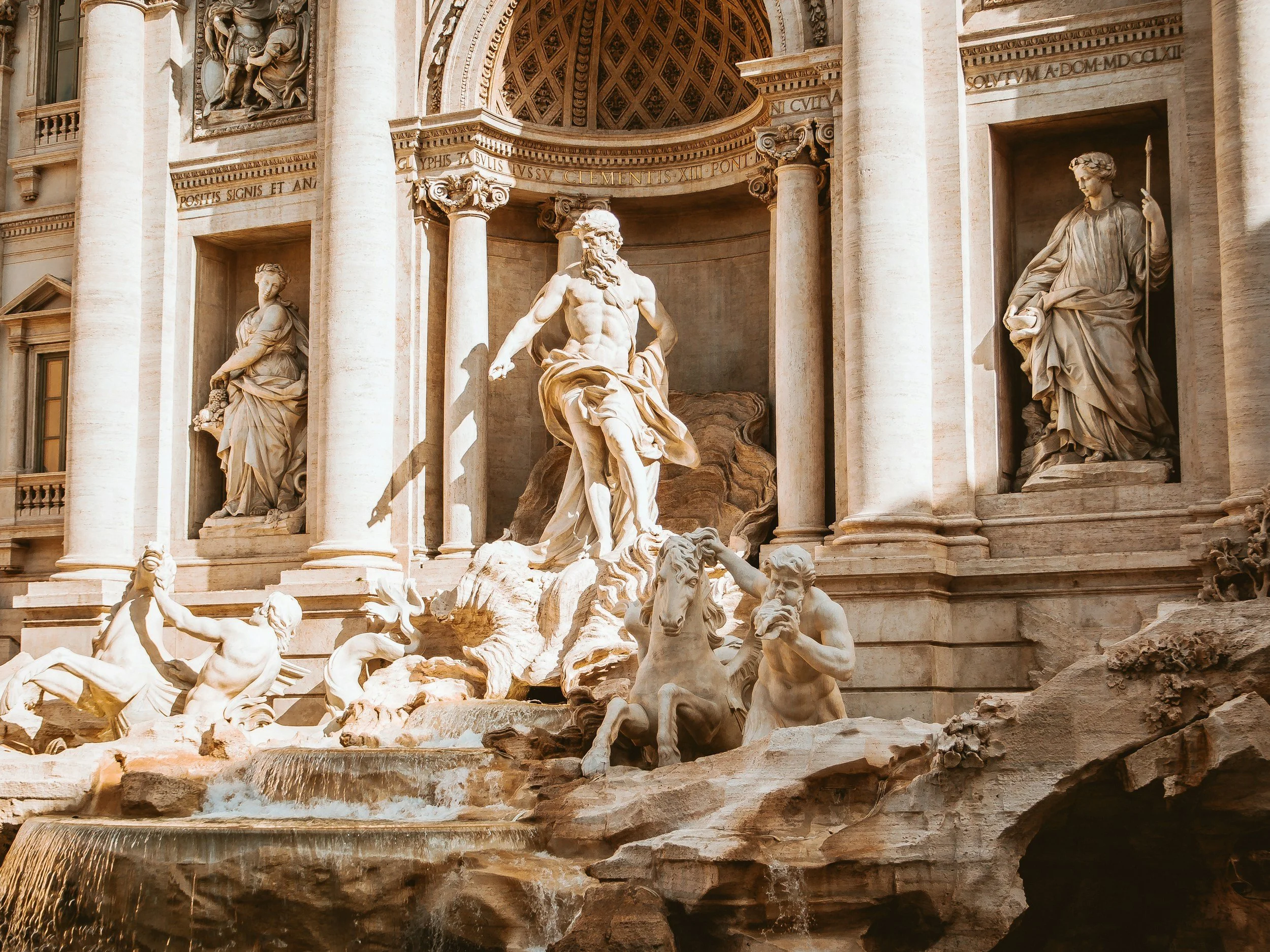
Adventure & Nature
Adventure & Nature
Villa Doria Pamphili
Rome’s largest landscaped park—far less touristed than Borghese, and better for long walks or morning runs. Locals bring their dogs, read under trees, and picnic near fountains.
DETAILS TO KNOW
Location: Monteverde
Price: Free
Vibe: Expansive, green, lived-in
Need to Know: Enter from Via di San Pancrazio for the prettiest route in
Janiculum Hill (Passeggiata del Gianicolo)
More viewpoint than hike—but the walk up is a nature-meets-history moment. You’ll pass fountains, sculptures, and street musicians before reaching a panoramic terrace overlooking the city.
DETAILS TO KNOW
Location: Above Trastevere
Price: Free
Vibe: Golden-hour favorite
Need to Know: Go at sunset. There’s a daily cannon fire at noon—unexpected and theatrical
Appian Way (Via Appia Antica)
One of the oldest roads in the world, now a peaceful, semi-rural walking and biking path just outside the city center. Cypress trees, crumbling aqueducts, and ancient catacombs.
DETAILS TO KNOW
Location: South of the Aurelian Walls
Price: Free (bike rental ~€15)
Vibe: Pastoral, cinematic, meditative
Need to Know: Sundays are car-free and ideal; rent bikes at EcoBike near Cecilia Metella
Orange Garden (Giardino degli Aranci)
A small, symmetrical hilltop park with citrus trees, 17th-century symmetry, and sweeping views of the Roman skyline.
DETAILS TO KNOW
Location: Aventine Hill
Price: Free
Vibe: Quiet, romantic, geometric
Need to Know: Combine with the nearby Keyhole of the Knights of Malta for a classic Aventine walk
Caffarella Park (Parco della Caffarella)
Part of the Appian Way system but wilder and more rustic. Sheep grazing, archaeological ruins, winding dirt paths, and very few tourists.
DETAILS TO KNOW
Location: South Rome
Price: Free
Vibe: Pastoral, unexpected, slow
Need to Know: Bring water—there are few facilities inside the park
Villa Borghese (But Make It the Back Paths)
Yes, it’s famous—but most people stick to the center. Veer into the smaller paths near the Globe Theatre and Zoo entrance for quiet, shaded walking trails.
DETAILS TO KNOW
Location: Above Piazza del Popolo
Price: Free
Vibe: Classic, landscaped, elegant
Need to Know: Rent an e-bike if you want to explore the whole park without rushing
Climb the Dome at St. Peter’s Basilica
It’s 551 steps to the top (or 320 if you take the elevator partway), and absolutely worth it. A tight spiral staircase leads to one of the best panoramic views in the city.
DETAILS TO KNOW
Location: Vatican City
Price: €8–€10
Vibe: Intense, vertical, iconic
Need to Know: Not for the claustrophobic; early morning or late afternoon is best
Horseback Riding in Ostia
Yes, you can ride horses in Rome. Private stables near the Ostia offer half-day guided rides across sandy beaches and ancient ruins.
DETAILS TO KNOW
Location: Ostia
Price: ~€40/hour
Vibe: Bucolic, surprising, very un-touristy
Need to Know: Book ahead, wear sneakers, and bring cash
Domus Aurea Underground Tour
Nero’s buried palace, excavated and opened to the public with hard hats and headlamps. Vast frescoed halls, echoing tunnels, and scaffolding all around.
DETAILS TO KNOW
Location: Near the Colosseum
Price: €18 with guide
Vibe: Archaeological, eerie, cinematic
Need to Know: Feels more like a dig than a museum—dress accordingly
Vespa rentals start at €45 - rent a red one and embrace your inner Italian
Pro Tip:
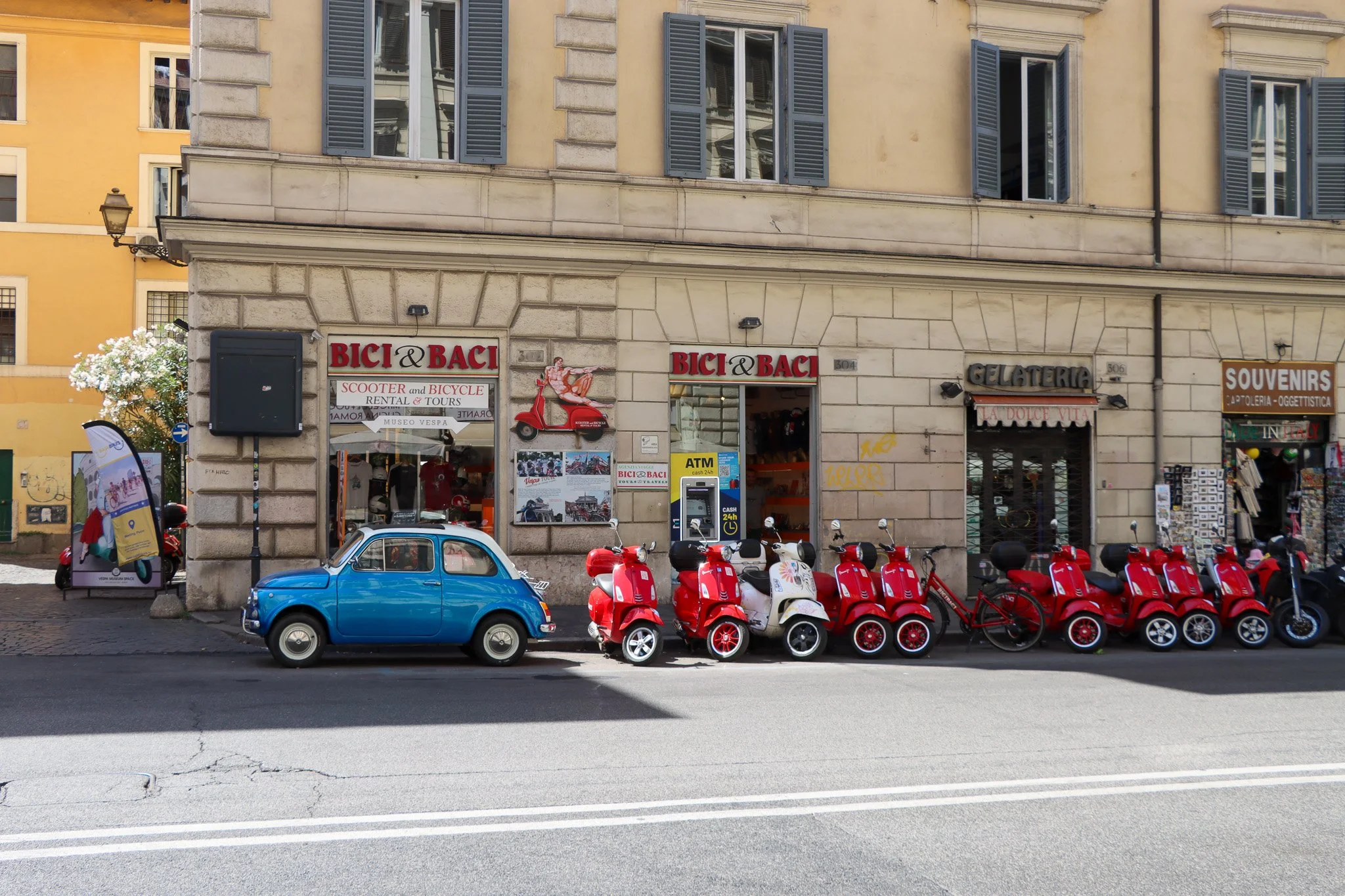
Classes & Workshops
Classes & Workshops
Aperture tours
Led by professional photographers, these private walking tours focus on technique, light, and storytelling—whether you're shooting golden hour at the Forum or gritty textures in Trastevere. It's less about landmarks, more about composition.
DETAILS TO KNOW
Location: Customizable (Centro, Trastevere, Colosseum, etc.)
Price: €€–€€€
Vibe: Cinematic, technical, visually immersive
Need to Know: Tailored for all levels; ideal if you're serious about improving your visual eye in one of the most photogenic cities on earth
Tasting Class at Rimessa Roscioli
More than a wine tasting—this is a cultural deep dive into Italian wine, cheese, and cured meats led by passionate experts. Smart, spirited, and very Roman.
DETAILS TO KNOW
Location: Near Campo de’ Fiori
Price: €€€
Vibe: Sociable, informative, high-quality
Need to Know: Often books out weeks in advance; tastings run 2.5+ hours and include dinner
Pasta-Making at Latteria Studio
Hosted in a gorgeous test kitchen by a former food stylist, this class feels more like a Roman dinner party than a school. Expect beautiful produce, hands-on technique, and wine.
DETAILS TO KNOW
Location: Monteverde
Price: €€€
Vibe: Intimate, editorial, homey
Need to Know: Small groups only—book well in advance; sometimes led in English, sometimes Italian
Nightlife
Nightlife
Salotto 42
Steps from the Pantheon, this intimate hole-in-the-wall cocktail bar draws a sharp, well-dressed crowd. Books line the walls, DJs play on vinyl, and the lighting is always flattering.
DETAILS TO KNOW
Location: Centro Storico
Price: €€
Vibe: Chic, soft-spoken, fashion-adjacent
Need to Know: Come early to claim a velvet armchair, or late when the energy softens
Bar del Fico
A Roman classic just off Piazza Navona. Lively tables spill into the square, chess games happen on the terrace, and inside it’s all amber light and casual buzz.
DETAILS TO KNOW
Location: Centro Storico
Price: €–€€
Vibe: Unfiltered Roman energy
Need to Know: Better for casual drinks with friends than intimate date nights
Cielo Bar
A rooftop cocktail terrace with panoramic views and maximalist elegance. Expect curated playlists, velvet banquettes, and a cocktail list that matches the sunset.
DETAILS TO KNOW
Location: Spanish Steps
Price: €€€
Vibe: Cinematic, elevated, celebratory
Need to Know: Best during golden hour; bar seats fill up quickly, book in advance if you want a table
Argot Bar
Hidden behind a nondescript door near Campo de’ Fiori, this intimate speakeasy blends vintage interiors with a theatrical cocktail menu. Low lighting, great acoustics, and not a tourist in sight.
DETAILS TO KNOW
Location: Centro Storico
Price: €€
Vibe: Dark, jazzy, whispery
Need to Know: There's a small annual membership fee at the door (~€5)—it’s symbolic and worth it
The Barber Shop
Styled like an American speakeasy-meets-barbershop, but very much Roman at heart. Cocktails are precise, lighting is ideal, and the crowd skews creative.
DETAILS TO KNOW
Location: Monti
Price: €€
Vibe: Masculine, theatrical, insider
Need to Know: Look for the red light on the door—it's not marked otherwise
The Jerry Thomas Speakeasy
The OG of Roman speakeasies, with a password-protected entrance and deeply serious cocktails. Classic spirits, rare labels, and bartenders who truly care.
DETAILS TO KNOW
Location: Near Campo de’ Fiori
Price: €€€
Vibe: Shadowy, old-school, tight-lipped
Need to Know: Book online, get the password, and arrive on time—this one plays by the rules
Co.So (Cocktail & Social)
In a quiet stretch of Pigneto, this compact bar blends Roman ingredients with global technique. No-frills on the outside, deeply creative behind the bar.
DETAILS TO KNOW
Location: Pigneto
Price: €€
Vibe: Local, experimental, under-the-radar
Need to Know: Ask for the “secret” drink menu—or order the carbonara sour
Drink Kong
Part Tokyo, part Blade Runner, this neon-lit bar in Monti is Rome’s most design-forward cocktail space. The drinks are serious—inventive, balanced, never gimmicky.
DETAILS TO KNOW
Location: Monti
Price: €€€
Vibe: High-concept, late-night, cinematic
Need to Know: There’s a “secret” back room called Japanese Room—quiet, minimal, perfect for two
La Punta Expendio de Agave
Mezcal in Trastevere? Surprisingly, yes—and it's excellent. Dim lighting, palm motifs, and cocktails that pull from Oaxaca and Calabria alike.
DETAILS TO KNOW
Location: Trastevere
Price: €€
Vibe: Tropical, fun, low-key wild
Need to Know: Come with no agenda; stay for one more than you planned
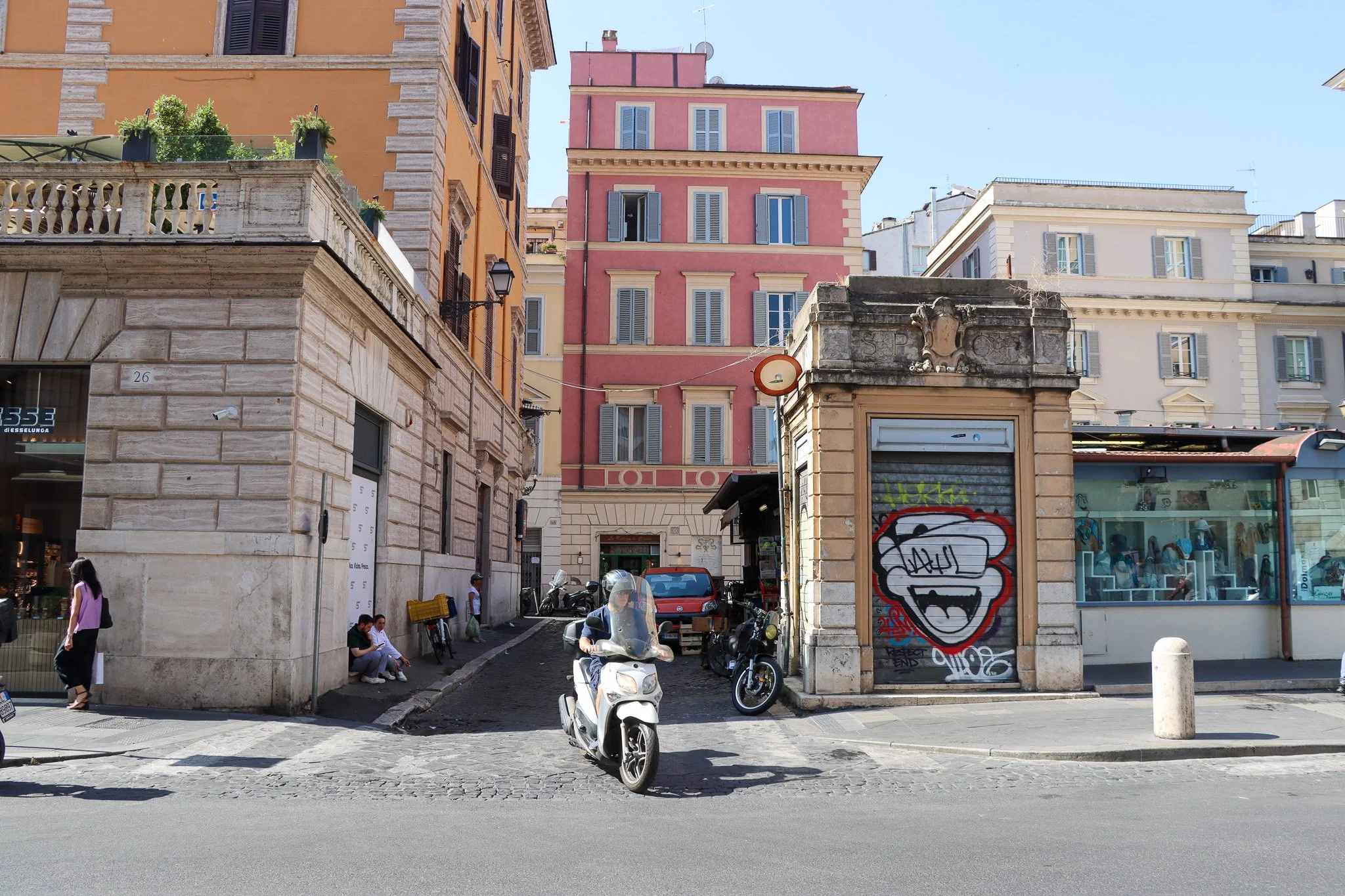
Fitness & Wellness
Fitness & Wellness
Six Senses Spa Rome
An entire wellness universe tucked inside a restored 15th-century palazzo. Roman bathing circuit, rooftop yoga, sound therapy, and intuitive facials—all deeply sensory.
DETAILS TO KNOW
Location: Near Piazza Venezia
Price: €€€€
Vibe: Elemental, holistic, quiet luxury
Need to Know: Non-hotel guests welcome for treatments or day passes; book in advance for spa rituals or rooftop movement
Irene Forte Spa
A sleek, modern spa with steam, sauna, salt room, and treatment suites, using Irene Forte skincare. Everything smells faintly of rosemary and citrus.
DETAILS TO KNOW
Location: Top of the Spanish Steps
Price: €€€
Vibe: Polished, serene, aromatherapeutic
Need to Know: You don’t have to be a hotel guest to book a massage—just reserve early and arrive an hour before to use the full thermal circuit
Kena Movement Dtudio
A light-filled boutique space offering English-speaking private and small group sessions in Pilates, barre, and functional movement. Understated and extremely well-run.
DETAILS TO KNOW
Location: Prati
Price: €€
Vibe: Calm, clean, no ego
Need to Know: Book via WhatsApp or email; ideal for a quiet reset after travel or museum overload
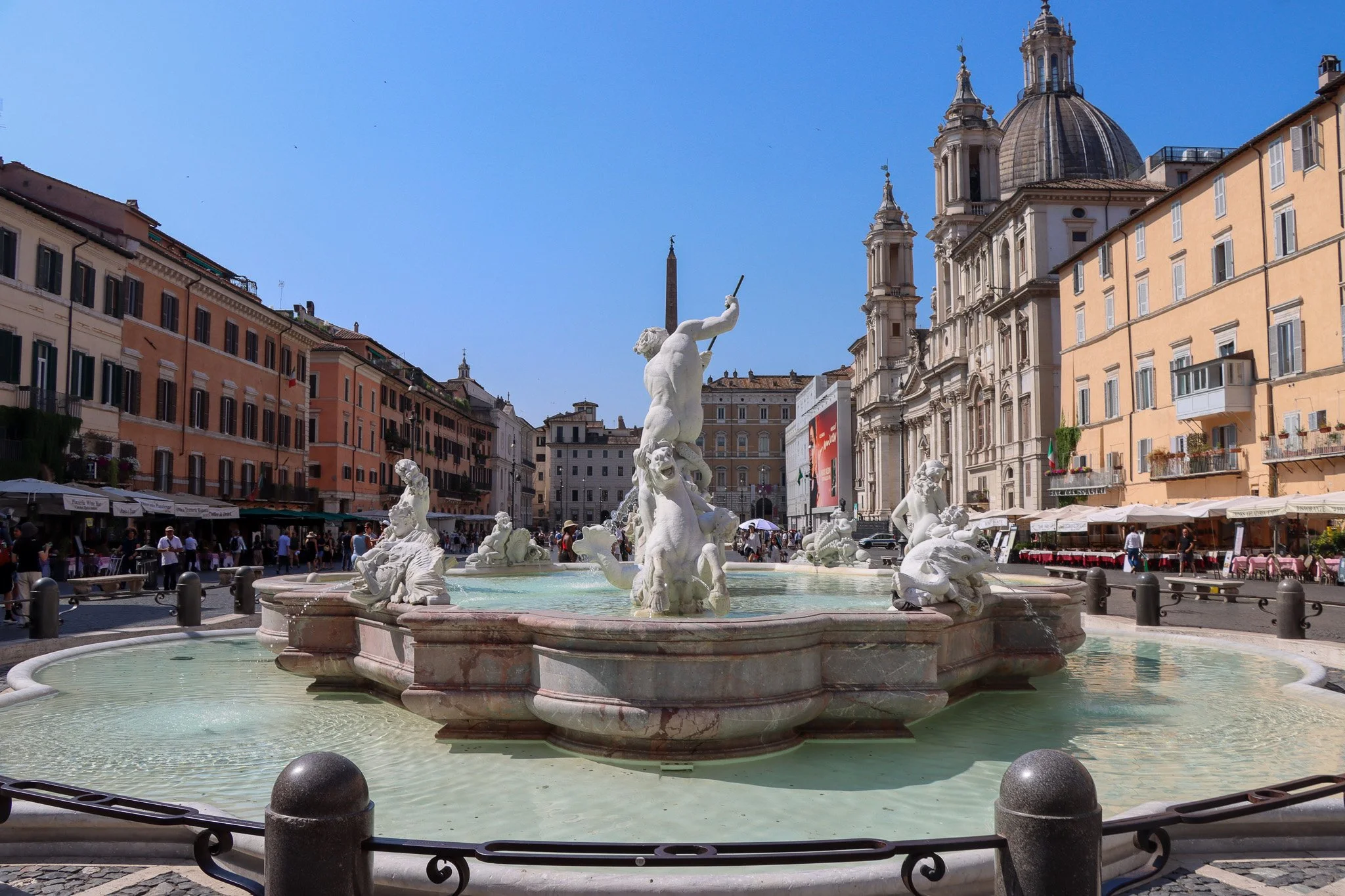
Sample Itinerary
If You Have 48 Hours
PART ONE: Arrival & Orientation
Land and get grounded. Drop your bags—ideally somewhere central (Hotel Valadier or Vilòn)—and walk straight into the rhythm of the city. No sightseeing yet. Just espresso at Sant’Eustachio, a slow wander past the Pantheon, and a feeling of arrival.
Lunch is timeless: Armando al Pantheon or Trattoria Da Gino for Roman classics without theatrics. Afterward, dip into something cultural but quiet—Palazzo Altemps for ancient sculpture and faded frescoes, or Centrale Montemartini for marble statues against industrial steel. Both are calm, cinematic, and mostly untouched by crowds.
PART TWO: Sunset, Spritz, TRADITION
As late afternoon settles in, cross the Tiber into Trastevere. Wander. Get lost. Have a spritz at Bar del Fico or something bitter at Freni e Frizioni—standing on the steps with paper cups, locals, and that pink Roman sky.
Dinner is Roman, but choose your version: SantoPalato for bold, modern, offal-rich menus; Trattoria Pennestri for something more grounded, warm, and polished. Afterward, if you’re not ready to end the night, slide into Jerry Thomas Speakeasy—password only, sharply made drinks, and candlelit quiet.
PART THREE: Mornings, Markets, Movement
Start early with a walk up Aventine Hill to the Orange Garden, where the skyline unfolds through citrus trees. Peek through the Keyhole of the Knights of Malta, then head toward Testaccio for breakfast—perhaps Panificio Passi for something sweet and local.
Explore the area or head back into town for more texture: Jewish Ghetto, Tiber Island, or a stroll through Campo de’ Fiori with a slice of pizza bianca from Forno Roscioli. If you skipped culture yesterday, this is your chance to see MACRO, the Scavi Tour, or something quietly extraordinary like Domus Aurea.
PART FOUR: Reset, Shop, Leave Beautifully
Afternoon is for reset or refinement. Treat yourself to a massage or thermal circuit at Six Senses Spa, or wander through the design-forward quiet of Villa Borghese. Shopping, if you didn’t yet: Chez Dédé, Campo Marzio Roma, or Giuliva Heritage.
For your final night: go out well. Dinner at Adelaide at Hotel Vilòn or up above the skyline at Cielo Bar. Let the night end on a note that fits—maybe drinks at Drink Kong, or live jazz at Charity Café.
Final morning? Keep it soft. Espresso and pastry at Forno Campo de Fiori or Roscioli Caffè, a slow walk through Monti or Via Margutta, and something small to slip into your carry-on—linen, a bottle, a pressed receipt. Rome never says goodbye outright. It lingers. You’ll feel it.
